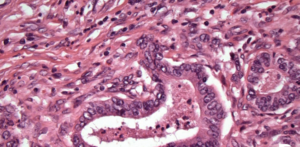 Colorectal cancer remains a major health problem in the United States. It’s the third most common type of cancer and the second leading cause of cancer death.
Colorectal cancer remains a major health problem in the United States. It’s the third most common type of cancer and the second leading cause of cancer death.
While the incidence of colorectal cancer is decreasing somewhat in the population, it has increased by 51 percent in people under the age of 50. This trend is expected to continue, with an estimated 90 percent increase in colon cancer incidence and 124 percent increase in rectal cancer incidence by 2030.
These young-onset patients are the focus of the Young-Onset Colorectal Cancer Center, a new virtual multidisciplinary research and treatment center to be launched in March by Dana-Farber/Brigham and Women’s Cancer Center (DF/BWCC) to improve the diagnosis and treatment of these patients. This new center is among the first of its kind in the United States.
Founder and Director of the new Center, Kimmie Ng, MD, MPH, says that the underlying reasons for the increase in colorectal cancer incidence among younger patients are still unknown. “Most of these young patients don’t have a genetic or family history, and therefore, we have an increasing sense of urgency around figuring out the underlying cause.”
According to Dr. Ng, issues associated with young-onset colorectal cancer start at diagnosis.
“Current guidelines call for people to be screened for colorectal cancer starting at age 45-50,” she said. “Not only are younger people not being screened, but when they present at their doctor’s office with symptoms like rectal bleeding or abdominal pain, colon cancer isn’t the first thing that immediately comes to mind. Therefore, they aren’t being diagnosed until the cancer has progressed.”
One of the goals of the new Young-Onset Colorectal Cancer Center is to increase public awareness around the rising burden of young-onset colorectal cancer so diagnoses happen more quickly and at an earlier stage, when the cancer is more curable.
“The Center will address the unique issues faced by these young patients, including therapies that affect fertility. We will offer molecular testing to determine the best course of treatment for our patients and, if genetically related, screening for family members is available,” said Ronald Bleday, MD, co-director, Colon and Rectal Cancer Center and chief of the Division of Colorectal Surgery at Brigham and Women’s Hospital.
Another goal is to provide comprehensive and cutting-edge care to patients, many of whom are otherwise healthy and want the latest, most aggressive treatments to improve their outcomes.
“Having colon cancer is difficult for everyone, but younger patients face unique challenges that older patients don’t,” Dr. Ng said. “They may still be in school or just starting their careers. They may have young families or want to plan a family. The new center is specifically designed to deliver the care they need.”
“Having colon cancer is difficult for everyone, but younger patients face unique challenges that older patients don’t,” Dr. Ng said. “They may still be in school or just starting their careers. They may have young families or want to plan a family. The new center is specifically designed to deliver the care they need.”
As an example, Dr. Ng pointed to the fact that every patient under the age of 50 will have a dedicated program navigator to help coordinate their care so that nothing is missed, including fertility preservation, sexual health, genetics and nutrition. The center also will provide complementary and alternative therapies to help with the treatment side effects that affect young patients’ daily lives.
“Younger patients often feel isolated because most other patients with colorectal cancer are older and at a different stage of life,” Dr. Ng said. “Our center gives them a supportive community of other young patients and offers opportunities for them to get together in person or online through forums and webinars. It helps them understand there are others just like them going through the same thing.”
The Young-Onset Colorectal Cancer Center also will focus on research initiatives to stimulate scientific discovery and innovations around new ways to prevent and treat the disease. Patients can participate directly in the center’s research by sharing their medical histories and contributing tumor, blood and stool samples.
“Each patient’s navigator will inform them about research opportunities they can participate in,” Dr. Ng said. “We are particularly interested in studying patients’ microbiomes, which may be a critical piece to understanding why the disease is occurring in younger patients. We’ll also be conducting single-cell RNA sequencing to characterize the different types of immune cells around the tumors so that we can determine if there is anything unique or targetable.”
Because insurance typically doesn’t cover genomically profiling tumors for early-stage cancers, the new center will cover the costs of the testing for its patients. A multidisciplinary molecular tumor board will review all profile results, and a personalized report of treatment recommendations tailored to the tumor’s profile will be provided to the treating physician.
“The new center brings together the best and brightest resources we have to ensure the best outcomes,” Dr. Ng concluded. “From lab scientists and epidemiologists, to gastroenterologists and surgeons, to clinical researchers and clinical trialists, our new center has an unparalleled level of top talent working together to solve the puzzle of young-onset colorectal cancer.”
“We are seeing an increase in patients with colorectal cancer under the age of 55, including patients in their 20s, that are not being identified early through screening,” said Ronald Bleday, MD.